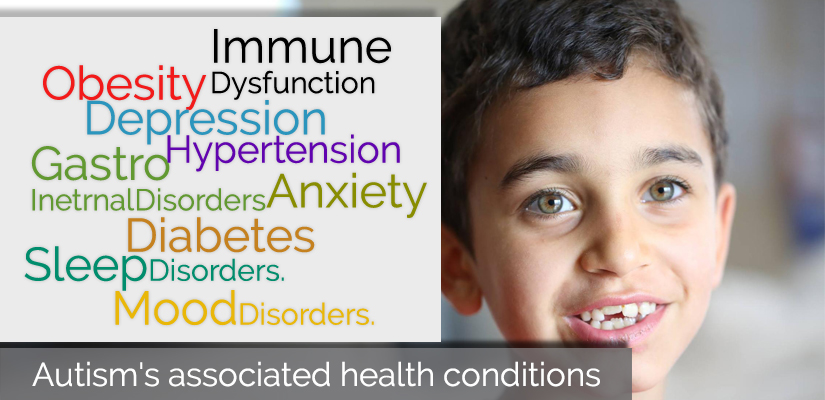
People who’re having autism disorder also have higher rates of certain medical and mental health conditions. The medical conditions in autism include seizures, gastrointestinal disorders or distress, eating or feeding problems, and sleep disturbances. The mental health condition of autism includes anxiety, depression, attention deficit and hyperactivity disorder schizophrenia and bipolar disorder.
If you need any assistance or have a question about Autism’s associated medical and mental-health conditions, you can consult our HearingSol experts with your problem, feel free to call us on +91-9327901950. We are always here to help you.
Medical Conditions In Autism
Gastrointestinal Disorders Or Distress
Research indicates that people with autism are more likely to experience gastrointestinal disorders or distress. Distress problems are considered the most common medical condition associated with autism.
These following symptoms that are characteristics of the possibility of distress:
- Abdominal pain
- Gaseousness
- Chronic diarrhea
- Chronic constipation
- Painful stooling
Seizures
Seizures can start at any age experts identified two times in which there is a higher chance of seizures starting in people with autism. Research has indicated that as many as 33% of children with autism experience seizures.
Autism Speaks (2017) lists the following symptoms that are characteristics of possible seizures:
- Unexplained staring spells
- Stiffening of muscles
- Involuntary jerking of limbs
Eating Or Feeding Problems
Young people show feeding problems when they are unable or refuse to maintain an adequate oral intake of food. Sources estimate that as many as 70% percent of people with Autism experience some type of feeding difficulties in early childhood. People who develop feeding disorders are at risk for weight loss, malnutrition, lethargic behavior, impaired intellectual and social-emotional development, and growth retardation.
Sleep Disturbances
Research indicates that as many as 80-90% of people with autism experience sleep disturbances, as opposed to 25-30% of typically developing children.
These following symptoms that are common sleep disturbances in people with Autism:
- Difficulty Falling Asleep
- Bedtime resistance
- Inability to fall asleep on own
- Inconsistent sleep routines
- Restless sleep
- Frequent night awakenings
- Extremely early rising
Impaired Immunity
The human body is a possible environment for many microbes i.e viruses, bacteria, fungi, and parasites. And the immune system prevents and limits their entry and growth to protect the body from infection. In the case of autism, people have an impaired immune system which causes many immunological problems like oxidative stress.
Mental Health Conditions of Autism
Depression
Depression can affect 25% of individuals on the autism. Symptoms of depression can involve but are not limited to chronic feelings of sadness, hopelessness, worthlessness, sudden weight gain or loss, poor sleep, social isolation, moving or talking slowly, and trouble concentrating.
Bipolar Disorder
This disorder affects 27% of individuals who are having an autism disorder. Symptoms can include but are not limited to periods of intense energy and social intrusion, with periods of flat affect and irritability.
All mental health conditions include a cluster of symptoms, not just one symptom. Thus, because your child may experience one symptom, it does not necessarily equate to having a mental health condition.
Anxiety
Symptoms of anxiety in people with autism disorder include :
- worrying thoughts
- extreme fear of new people
- dislike of going to new places or trying new things
- fear of specific stimuli, and
Schizophrenia
Schizophrenia is an adult disorder there can be early onset in childhood. Experts indicate that some adults on the autism disorder also have schizophrenia. This is a very difficult condition to diagnosis both autism and schizophrenia have difficulty with processing language and perspective-taking of other people’s thoughts and feelings. If the adult is the nonverbal or limited language it hard to determine if hallucinations are being experienced.
If you need any assistance or have a question about Autism’s associated medical and mental-health conditions, you can consult our HearingSol experts with your problem, feel free to call us on +91-9327901950. We are always here to help you.
